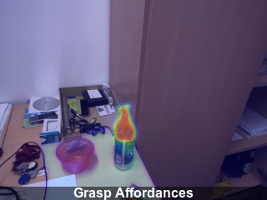Nachricht
| CSE-A: Interesting interdisciplinary seminar on artificial and biological visual attention | ||||
| Datum: | 2015/10/22 | |||
| Uhrzeit: | 13:00 Uhr | |||
| Ort: | P 1.6.02.1 | |||
|
Cognitive Systems Engineering A - Visual Attention (MS ET: L.048.23019; MS ESE: L.048.90701; CS/Psychology: please contact us) In computer vision, systems are often challenged with problems that humans solve seemly without any effort. This advantage results in a large part from the fact that perceptual processing is supported by attention. Attentional mechanisms can select relevant information from the enormous stream of incoming data and distribute processing resources accordingly. Some of these processes are already well understood in humans and have been transferred to technical applications. However, the investigation of human and artificial attention is a highly active fields. This seminar aims at practically contributing to research on the boundary between cognitive psychology and computer vision. Cognitive psychology investigates human attention (among other cognitive mechanisms), and computer vision applies technical solutions in the domain of vision. In both fields, highly different methods are applied. In the practice-oriented seminar, the experimental methods of cognitive psychology are explained and practically applied. Students plan, implement and execute perception experiments and evaluate the collected data. Then the newly obtained knowledge is applied to enhance technical systems. Here again, (technical) experiments are performed to evaluate the enhancements. Hence, students from technical subjects are given the opportunity to learn new methods and make use of them in their work. The particular topic in this semester is the measurement of the strength of saliency. Saliency describes how strong an visual element stands out from its environment (e.g., a red ball in the green grass may be highly salient). Features of interest are color, orientation, symmetry and others. Such features are already used in technical systems; it is however often unclear how important the individual features are or how they should be combined. In human attention, this is not well understood either. In the seminar, these aspects are investigated to close this gap. If you are interested in interdisciplinary work and learning new methods, this seminar should be interesting for you. Note, for example, that cognitive psychology employs natural science approaches, much like, for instance, physics, where systematic experiments are conducted to uncover fundamental aspects of the research topic. You may be more familiar with engineering science approaches, which proceed differently in many ways. Hence, this is a chance to widen your horizon. Note, however, that such a seminar requires some commitment. Designing and executing experiments, recruiting subjects and interpreting results requires time and effort. Similarly, implementing novel concepts on the border of scientific advancement in technical systems is challenging as well. If these warnings rather raise your interest instead of intimidating you, our seminar may be just the right course for you to join! The course can fit into the Electrotechnik and Electrical Systems Engineering master's degree programs, and is suited as well for students of Computer Science with the minor subject psychology. If you have any questions, just contact us: tuennermann(a)get.upb.de
|
||||



